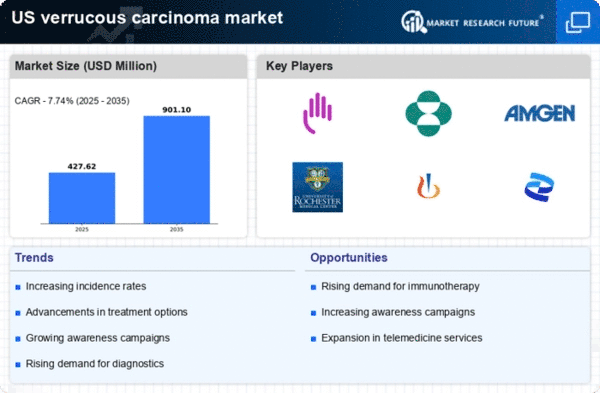Growing Investment in Oncology Research
The surge in investment in oncology research is a crucial driver for the verrucous carcinoma market. Funding from both public and private sectors has been directed towards understanding the molecular mechanisms underlying various cancers, including verrucous carcinoma. This influx of capital is likely to accelerate the development of novel treatment options and improve existing therapies. As research progresses, the market may benefit from the introduction of innovative drugs and treatment protocols, which could enhance patient care. The focus on personalized medicine in oncology is also expected to play a role in shaping the future of the verrucous carcinoma market, as tailored therapies become more prevalent.
Rising Incidence of Verrucous Carcinoma
The increasing incidence of verrucous carcinoma in the US is a pivotal driver for the verrucous carcinoma market. Recent data indicates that the prevalence of this type of cancer has been on the rise, particularly among individuals with a history of tobacco use. This trend is likely to escalate demand for diagnostic and therapeutic options, thereby expanding the market. As healthcare providers become more vigilant in identifying and treating verrucous carcinoma, the market is expected to witness a surge in both awareness and treatment modalities. The growing number of cases may also prompt further research into effective therapies, which could enhance the overall landscape of the verrucous carcinoma market.
Increased Focus on Preventive Healthcare
The heightened emphasis on preventive healthcare is influencing the verrucous carcinoma market positively. As awareness of skin cancers grows, individuals are more inclined to seek regular screenings and preventive measures. This trend is likely to lead to earlier detection of verrucous carcinoma, which can significantly improve treatment outcomes. Healthcare providers are increasingly advocating for preventive strategies, including lifestyle modifications and routine check-ups, which may contribute to a decline in advanced cases. Consequently, the market could experience growth as more patients engage with healthcare systems for preventive care, thereby fostering a proactive approach to managing verrucous carcinoma.
Regulatory Support for Innovative Therapies
Regulatory support for innovative therapies is emerging as a vital driver for the verrucous carcinoma market. The US Food and Drug Administration (FDA) has been actively streamlining the approval process for new cancer treatments, which may encourage pharmaceutical companies to invest in research and development. This supportive regulatory environment could lead to the rapid introduction of novel therapies specifically targeting verrucous carcinoma. As more treatment options become available, patients may benefit from improved efficacy and safety profiles. The potential for expedited approvals and incentives for breakthrough therapies is likely to stimulate growth in the verrucous carcinoma market, fostering a more dynamic treatment landscape.
Technological Advancements in Diagnostic Tools
Technological innovations in diagnostic tools are significantly influencing the verrucous carcinoma market. Enhanced imaging techniques and molecular diagnostics are enabling earlier and more accurate detection of verrucous carcinoma. For instance, the integration of artificial intelligence in pathology is streamlining the diagnostic process, potentially leading to improved patient outcomes. As these technologies become more accessible, healthcare providers are likely to adopt them, thereby increasing the demand for related services and products. The market could see a notable shift as these advancements not only facilitate timely diagnosis but also contribute to the development of targeted therapies, further propelling the verrucous carcinoma market.
















